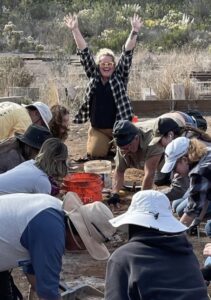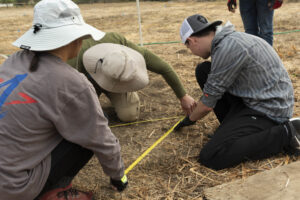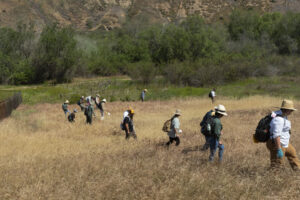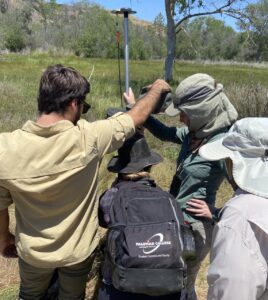Students have the opportunity to earn their Associates degree in Archaeology (35 units) and/or an Archaeological Technician Certificate of Achievement (18 units). Already completed classes for the Archaeology Technician Certificate? Fill out your graduation petition here. Want to learn more about our Anthropology Program? Visit the Palomar College Anthropology Website.
The Palomar Archaeology Program, with its A.A. Degree, A.A.T emphasis, and Certificate of Achievement, is oriented toward three audiences:
- students who seek immediate or eventual employment in Cultural Resource Management as an excavator, surveyor, lab assistant, and/or cartographer
- students who wish to gain valuable technical field and lab skills along the way toward a B.A. or advanced degree in Anthropology/Archaeology
- interested members of the public who would like to work on archaeological projects as an avocation and desire some training, e.g., the Excavation Certificate
In addition to standard excavation, surveying, and laboratory skills, the program offers training in database management, computer aided drafting (AutoCad), GPS, and GIS (Geographic Information Systems).
Course Descriptions
ANTH 110 – Introduction to Archaeology: Another name for this class might be “Lost Cities and Civilizations”. The course presents a basic history of archaeology and explores the methods behind the study of material culture. The remainder of the semester is given over to a survey of world prehistory from our hominid beginnings to the first state level societies. There is no prerequisites for this course.
ANTH 120 – Archaeological Excavation: Focuses on basic techniques of surface collection; unit layout and unit excavation techniques; wet and dry screening; identifying, sorting, and bagging of artifacts; collection of radiocarbon, macrobotanical, and pollen samples; flotation; unit level record keeping; unit photography; unit soil profiles; and field journal. Also includes material on the phases of Cultural Resource Management, research designs, site significance, and discussion of human remains. This class is offered every fall.
ANTH 121 – Applying Archaeology: This class covers the historical, legal, and operational contexts of Cultural Resource Management (CRM or Applied Archaeology). In addition to CRM, this class also gives an overview of career paths in archaeology, including Indigenous archaeology, state and federal agencies, and curation. Educational requirements and skills are also covered.
ANTH 205 (Prehistoric) and ANTH 206 (Historical) – Advanced Archaeological Excavation: Provides additional experience in refining the techniques of archaeological excavation learned in ANTH 120. Advanced students serve as mentors to beginning students in addition to writing papers on prehistoric/historic archaeological topics. These classes meet concurrently with ANTH 120 in the fall.
ANTH 210 – Archaeological Surveying: Provides basic instruction in map and compass navigation ; field survey techniques; site recording; completion and submission site forms; use of survey grade GPS units and Total Stations to collect mapping data ; and preparation of a site survey report. Course consists of 32 hours in the classroom & 32 hours in the field in the project area.
ANTH 215 – Archaeological Laboratory Analysis: Provides basic instruction and experiential labs for the identification, analysis, and report write-up of shellfish remains, faunal remains, ceramics, stone tools, debitage, and basic data on floral (botanical) residue analysis.
Other topics include radiocarbon dating, obsidian sourcing and obsidian hydration dating, collection processing and curation, artifact illustration and photography, and database management. Students are encouraged to use MS Excel for the production of tables and charts. Except for those focusing on curation, most students produce an artifact analysis report with tables, charts, and graphs.
ANTH 220 – Advanced Archaeological Survey focuses on the use of electronic instruments for survey and mapping in concert with the beginning survey course. Each student has a site mapping project. Course involves at least 32 hours in the field. Meets concurrently with ANTH 210.
ANTH 225 – Historical Archaeology: Method and theory of historical archaeology, including archival research, artifact identification, and report preparation. Training in the location and interpretation of archival documents, such as Spanish land grant documents, homestead patents, Sanborn fire insurance maps, assessor’s records, and historic topographic maps. A field trip to local historical archives in San Diego is also included. Training in the identification of ceramic, glass, and metal artifacts and their associated function, method of manufacture, manufacturer, and temporal distribution is also an important part of the course.
CLASSES LEADING TO AN ASSOCIATES DEGREE IN ARCHAEOLOGY
ANTH 100 – Introduction to Biological Anthropology Lecture. Biological Anthropology is one of the four branches of American Anthropology. This lecture class covers a broad range of topics. We begin with the nature of scientific inquiry, then move into the historical development of evolutionary theory. From there we explore basic cell theory and genetics, and follow up with primate phylogeny. These concepts are used to explore the fossil record for primate evolution, the rise of the hominids, and the emergence of modern humans. The lessons of the past are finally synthesized in a discussion of modern human variation and the ecological problems faced by our species.
ANTH 100L – Biological Anthropology Laboratory. This course teaches students how to recognize the various parts of the mammalian vertebrate skeleton, including the human skeleton. This knowledge is very useful to have in the field as the archaeologist often encounters both animal and human bone. Human bone is subject to certain California and Federal laws and it is important to be able to recognize such bones in the field.
ANTH 101 – Introduction to Biological Anthropology with Laboratory. This class is a 4 unit class that combines ANTH 100 (Biological Anthropology) and ANTH 100L (Biological Anthropology Lab). Combining the lecture and lab is the preferred way to take this course if your schedule allows. 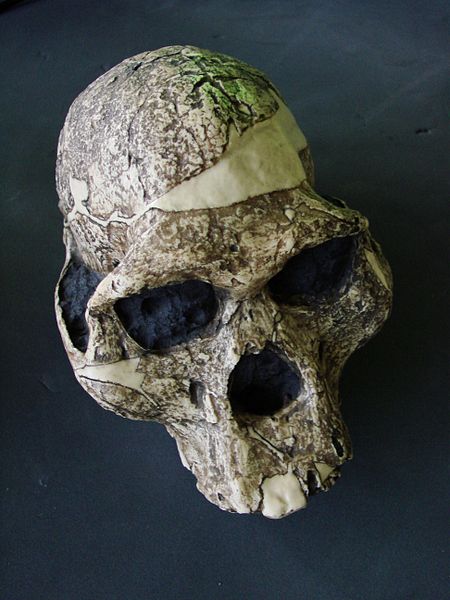
ANTH 296 and 297 – Special Problems in Biological Anthropology or Archaeology: Students with previous coursework in Anthropology can pursue individual research or tutorial projects of interest. This class is set up individually between the professors and the student. Please contact them before enrolling in this course.
ANTH 298 – Internship in Archaeology: Interested students in the Palomar Archaeology Program can sign up for 2-4 units of CE 150 and obtain internships at county Cultural Resource Management (CRM) or environmental firms, museums, and government agencies. Most internships are unpaid, but paid positions are occasionally available. To date, students have interned at Tierra Environmental Services, ASM Affiliates, ESquaredM, California State Parks (San Diego, Cuyamaca, and Anza Borrego offices), San Diego Archaeological Center (SDAC), PanGIS, the South Coastal Information Center (SCIC), the Barona Museum and Cultural Center, the San Diego Museum of Man, and the Palomar Archaeology Lab.


